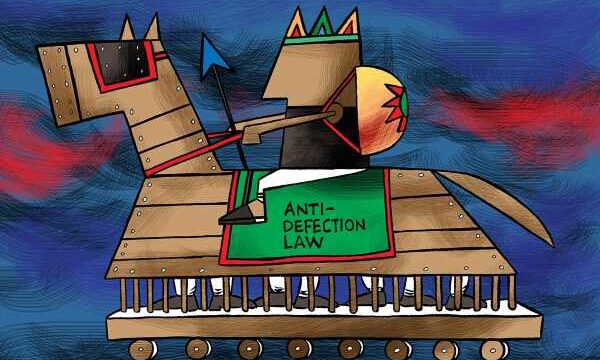Should the anti-defection law in India exist only to prevent democratically elected governments from being toppled?
Last month, Churchill Alemao, former Goa chief minister, met Praful Patel, lieutenant of the Ajit Pawar-led Nationalist Congress Party, resigned from the Trinamool Congress, and is reportedly in talks to rejoin the NCP.
Many see his career as one reason why India’s anti-defection law must be amended.
To say Alemao is a peripatetic politician might be an understatement.
He was first elected an MLA on the Congress ticket in 1989.
Three months later, possibly because he was left out of the Goa cabinet, Alemao rebelled and brought down the Pratapsingh Rane government.
He went on to become Goa’s first Catholic chief minister for just 18 days, leading the Progressive Democratic Front government.
In 1996, Alemao was elected an MP from South Goa on the United Goa Democratic Party ticket.
He returned to the Congress in 1999, and won his assembly seat.
He was defeated in the 2002 state elections, but became a Congress MP in 2004.
He left the Congress again, and contested the 2007 Goa elections on the Save Goa Front Party ticket.
The Congress later inducted him into the state cabinet, and made him minister.
In 2014, he sought Lok Sabha nomination from the Congress for his daughter, which the party refused.
He quit the party and, within days, joined the TMC, fighting the election on the TMC ticket.
He lost — the seat was won by the BJP — and resigned from the TMC.
In 2016, he joined the NCP and contested the assembly election from Benaulim, becoming the only NCP MLA in the Goa assembly.
Ahead of the 2022 assembly elections, he ‘merged’ the NCP with the TMC and became the ‘only Trinamool MLA in the assembly’ (being the lone NCP MLA, the Anti Defection Act did not apply).
Many argue that Alemao is the prime example of the Aya Ram Gaya Ram brand of politics, which was the norm in the 1960s and 1970s, leading ultimately to the amendment of the Constitution and the introduction of the Anti-defection Law (Tenth Schedule).
However, this has not prevented defection as a crucial tool of power.
For instance, no political party secured a clear majority after the 2018 assembly election in Karnataka.
“B S Yediyurappa of the Bharatiya Janata Party became chief minister for three days and resigned as he could not prove his majority. After that, H D Kumaraswamy of the Janata Dal-Secular became chief minister for 13 months. He had to resign after defections and resignations led to his government losing the trust vote in the assembly,” points out Chakshu Roy, who heads the legislative and civic engagement initiatives at PRS Legislative Research.
“It resulted in Yediyurappa returning to the driver’s seat for two years,” Roy adds.
Madhya Pradesh also went to the polls in late 2017.
“After this election,” says Roy, “Kamal Nath of the Congress formed the government with the support of Independents and other parties. Resignations by Congress MLAs brought down his government in about 13 months”.
As the Congress has been the biggest “victim” of defections, at its Raipur plenary in February this year the party announced it would amend the Constitution to change the defection law, which it had ‘pioneered and strengthened’.
;Since 2014, the BJP has engineered mass defections, purchased legislators and thus toppled democratically elected government after government. The Congress will amend the Constitution to eliminate such practices,’ the party stated.
But the Congress did not specify the exact nature of the amendments.
Former Lok Sabha secretary general P D T Achary said several aspects of the law needed review: For instance, the issue of “merger”, which is being misused “quite thoroughly nowadays”.
Achary said under Paragraph 4 of the 10th Schedule, if a member of the legislature claimed that his/her original political party had merged with another party and that he/she and others who constituted two-thirds of the total strength of the party had become members of that party, then they would escape disqualification.
But both two-thirds of the legislators and the original political party have to agree to the merger.
Recent court judgments interpreting this provision have added to the confusion — for instance, the February 2022 order of the Goa bench of the Bombay high court involving the Goa assembly’s Congress members who joined the BJP.
It said that if two-thirds of the legislators merged with another party, this was a merger in law and the merger of the original political party was not an essential requirement.
This order has left the floodgates open for defection.
But should the anti-defection law in India exist only to prevent democratically elected governments from being toppled?
Roy says the law’s applicability is less about providing stability to governments and more about strengthening the hands of the party leadership in dealing with dissenting legislators.
His argument is that according to the current piece of legislation, if legislators voluntarily give up their membership of a party, they can be accused of defecting from it.
“This state of affairs gives political parties immense power to stamp out internal dissent by threatening its MPs and MLAs with disqualification from the legislature,” says Roy.
“Lawmakers who do not see eye to eye with the party’s leadership risk losing their seat in the legislature for voicing their opinion.”
Roy says this is a serious fetter on inner-party democracy.
Of course, when it comes to single-MLA party units like the ones headed by Alemao, this law does not apply, though it can lead to more, not less, instability.
As Lok Sabha elections draw close, deeper scrutiny of the anti-defection law is needed.
Feature Presentation: Aslam Hunani/Rediff.com
Source: Read Full Article
